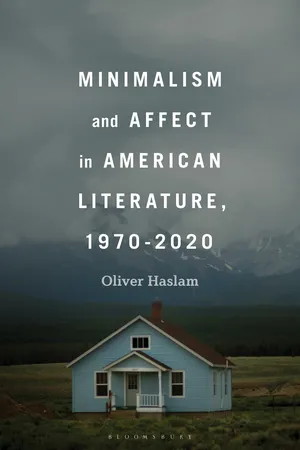
- 216 pages
- English
- ePUB (mobile friendly)
- Available on iOS & Android
eBook - ePub
Minimalism and Affect in American Literature, 1970-2020
About this book
Shortlisted for the BACLS Monograph Prize 2025
Theorizes the development of a minimalist mode in American fiction since 1970, frequently seen to interrogate US postmodernity.
Minimalism and Affect in American Literature, 1970-2020 responds to existing studies of literary minimalism by pursuing three original and interrelated objectives. It provides a more inclusive and precise definition of minimalism that enables further inquiry into the mode. It also exposes the presence of minimalism beyond critical demarcations that attempt to limit the aesthetic to a particular school, medium, movement, form or decade. Finally, it argues that writers of American literary minimalism are uniquely privileged in their ability to formalize precarity and threatening cultural currents into the fragile construct that is ordinary life.
Building upon theories of affect and the everyday, Minimalism and Affect in American Literature, 1970-2020 analyses minimalist aesthetics within the works of canonical minimalists alongside writers more frequently associated with other movements. Through readings of Ernest Hemingway, Joan Didion, Raymond Carver, Paul Auster and Don DeLillo, among others, and cultural phenomena ranging from sedation to telephony, this book exposes the persistence and political importance of minimalism within American literature from the 20th century into the 21st.
Theorizes the development of a minimalist mode in American fiction since 1970, frequently seen to interrogate US postmodernity.
Minimalism and Affect in American Literature, 1970-2020 responds to existing studies of literary minimalism by pursuing three original and interrelated objectives. It provides a more inclusive and precise definition of minimalism that enables further inquiry into the mode. It also exposes the presence of minimalism beyond critical demarcations that attempt to limit the aesthetic to a particular school, medium, movement, form or decade. Finally, it argues that writers of American literary minimalism are uniquely privileged in their ability to formalize precarity and threatening cultural currents into the fragile construct that is ordinary life.
Building upon theories of affect and the everyday, Minimalism and Affect in American Literature, 1970-2020 analyses minimalist aesthetics within the works of canonical minimalists alongside writers more frequently associated with other movements. Through readings of Ernest Hemingway, Joan Didion, Raymond Carver, Paul Auster and Don DeLillo, among others, and cultural phenomena ranging from sedation to telephony, this book exposes the persistence and political importance of minimalism within American literature from the 20th century into the 21st.
Frequently asked questions
Yes, you can cancel anytime from the Subscription tab in your account settings on the Perlego website. Your subscription will stay active until the end of your current billing period. Learn how to cancel your subscription.
No, books cannot be downloaded as external files, such as PDFs, for use outside of Perlego. However, you can download books within the Perlego app for offline reading on mobile or tablet. Learn more here.
Perlego offers two plans: Essential and Complete
- Essential is ideal for learners and professionals who enjoy exploring a wide range of subjects. Access the Essential Library with 800,000+ trusted titles and best-sellers across business, personal growth, and the humanities. Includes unlimited reading time and Standard Read Aloud voice.
- Complete: Perfect for advanced learners and researchers needing full, unrestricted access. Unlock 1.4M+ books across hundreds of subjects, including academic and specialized titles. The Complete Plan also includes advanced features like Premium Read Aloud and Research Assistant.
We are an online textbook subscription service, where you can get access to an entire online library for less than the price of a single book per month. With over 1 million books across 1000+ topics, we’ve got you covered! Learn more here.
Look out for the read-aloud symbol on your next book to see if you can listen to it. The read-aloud tool reads text aloud for you, highlighting the text as it is being read. You can pause it, speed it up and slow it down. Learn more here.
Yes! You can use the Perlego app on both iOS or Android devices to read anytime, anywhere — even offline. Perfect for commutes or when you’re on the go.
Please note we cannot support devices running on iOS 13 and Android 7 or earlier. Learn more about using the app.
Please note we cannot support devices running on iOS 13 and Android 7 or earlier. Learn more about using the app.
Yes, you can access Minimalism and Affect in American Literature, 1970-2020 by Oliver Haslam in PDF and/or ePUB format, as well as other popular books in Literature & Literary Criticism Theory. We have over one million books available in our catalogue for you to explore.
Information
Table of contents
- Cover
- Halftitle Page
- Dedication Page
- Title Page
- Contents
- Acknowledgements
- Introduction: Minimalism and affect
- 1 Origins, contexts, and Ernest Hemingway’s inefficient minimalism
- 2 Sedation and exposure in Joan Didion’s Play It As It Lays
- 3 Telephonic tonalities in the stories of Raymond Carver
- 4 Blank spaces: Paul Auster’s environments of erasure
- 5 Orbiting the ordinary in Don DeLillo’s fiction
- Conclusion
- Bibliography
- Index
- Imprint